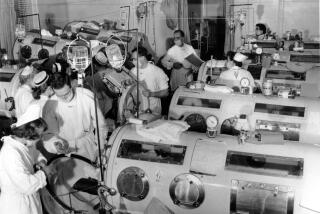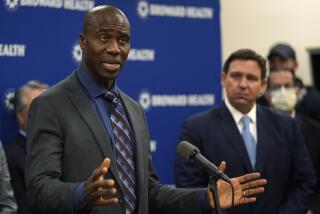George W. Comstock, 92; epidemiologist was influential in the treatment of tuberculosis
Dr. George W. Comstock, a pioneering epidemiologist who almost single-handedly blocked the use of the flawed BCG tuberculosis vaccine in the United States and who played a key role in the development of other prevention strategies against the disease, died Sunday at his home in Smithsburg, Md. He was 92 and had battled prostate cancer for several years.
Comstock was a young commissioned officer in the U.S. Public Health Service after World War II when federal officials were considering a mass vaccination campaign against tuberculosis using the relatively new Bacille Calmette-Guérin vaccine, which is made from an attenuated strain of mycobacterium that produces TB in cows.
He organized a trial of the BCG vaccine in Georgia and Alabama that stretched from 1947 to 1951 and concluded that the vaccine had an efficacy of only 14% in preventing the disease. He argued forcefully that the efficacy was too low to produce widespread benefit and that vaccination would render the Mantoux skin test for detecting TB infections useless by making vaccine recipients permanently positive.
In a country like the United States, with a relatively low incidence of TB, he argued, it was more important to be able to identify those exposed to the mycobacterium and treat them. Federal authorities agreed, and the vaccine was never widely used here.
“He always saw this as one of his most important contributions,” said Dr. Jonathan Samet, chairman of the department of epidemiology at the Johns Hopkins Bloomberg School of Public Health, where Comstock taught for more than 40 years.
In the 1950s, after the development of the TB drug isoniazid, Comstock learned that Alaska had one of the highest TB rates in the world.
He moved his family to Bethel, Alaska, and began administering the drug to everyone who had been exposed to the mycobacterium — as well as to himself and his family.
He showed that the drug could prevent infections from progressing to full-blown TB, and that the optimum treatment time with the drug was nine months. The protocol he developed for therapy — still in use — was a major contributor in bringing the outbreak in Alaska under control.
After 21 years in the Public Health Service, Comstock retired and joined Hopkins, where he founded the university’s Training Center for Public Health Research and Prevention in Hagerstown, Md. — a unit that was renamed after him in 2004.
He pioneered work in community-based health studies looking for the causes of cancer, heart disease, eye disease and other ailments.
He was among the first to collect blood and other biological samples that were frozen and stored for future analysis. By looking at samples from patients who developed cancer, for example, the researchers could determine whether there were any substances in the blood that might have predicted the onset of the disease.
There was great interest at the time in whether consuming supplements containing vitamin A and beta-carotene might reduce the risk of lung cancer among smokers. His studies showed that, at best, there was only a small association between higher levels of the supplements and a reduced risk.
George Wills Comstock was born Jan. 7, 1915, in Niagara Falls, N.Y. While pursuing his undergraduate studies at Antioch College in Ohio, he obtained a part-time job at Eli Lilly’s pharmaceutical laboratory.
He worked in a lab that studied pellagra.
Although his job “mostly involved washing glassware and cleaning dog cages,” he later said, his boss persuaded him to switch from biochemistry to medicine and to attend Harvard Medical School.
Upon graduation from Harvard, he joined the Public Health Service because it paid more than a conventional internship.
He subsequently received a master’s degree in public health from the University of Michigan and a doctorate from Johns Hopkins.
Outside of medicine, Comstock’s passion was music. He was a woodwind player in various symphony orchestras and for many summers took part in recorder camps. “Early music” was frequently heard in his household; he taught the entire family to play the recorder.
Comstock frequently quoted Horace Mann’s 1859 commencement address at Antioch College: “Be ashamed to die before you have won some victory for humanity.” Comstock expanded on that theme, noting that “most of us aren’t going to win any big victories, but we can win little ones every day, and they mount up.”
Comstock’s wife of 60 years, Margaret Karr Comstock, died in 1999. In 2001, he married the former Emma Lou Davis.
In addition to his wife, Comstock is survived by two sons, Dr. Gordon Frederick Comstock of Arcade, N.Y., and Dr. Lloyd Karr Comstock of Chapel Hill, N.C.; a daughter, Martha Wills Comstock Williams of Marietta, Ga.; five grandchildren; one great-granddaughter; two stepchildren; and two step-grandchildren.
thomas.maugh@latimes.com
More to Read
Start your day right
Sign up for Essential California for the L.A. Times biggest news, features and recommendations in your inbox six days a week.
You may occasionally receive promotional content from the Los Angeles Times.






